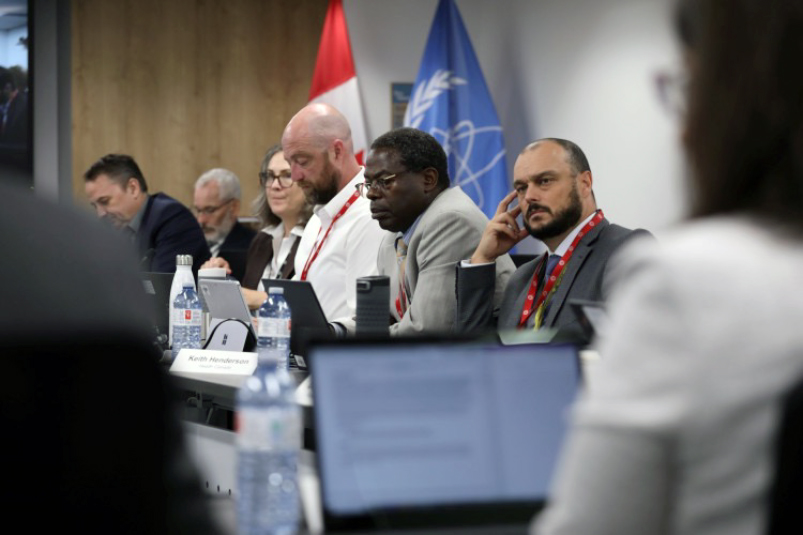Canada Improves Already Outstanding Reputation Following International Atomic Energy Agency Nuclear Emergency Preparedness Review Mission
Canada is a world leader in nuclear emergency preparedness and response. This reputation was achieved through continuous improvement and is highly valued. In 2019, Canada became the first and only G7 country to request and host an Emergency Preparedness Review (EPREV) mission led by the International Atomic Energy Agency (IAEA), which highlights Canada’s commitment to protecting the health, safety, and environment of Canadians.
Canada requested the EPREV mission to evaluate our preparedness to respond to a nuclear emergency at a nuclear power plant and to identify areas for improvement. The review involved over 40 partners from various federal departments and agencies, along with relevant ministries from the provinces of Ontario and New Brunswick, applicable municipalities, and the nuclear power plant operators. This is representative of not only the scale of our nuclear emergency preparedness, but also how involved and interdependent all levels of government and industry are in preparing for, responding to, and recovering from a nuclear emergency.
Canada’s comprehensive and mature preparedness structure and application of IAEA safety standards across all levels of government were recognized by the IAEA following the initial 11-day mission in June 2019 and were reflected in their 2019 report: Peer Appraisal of the Arrangements in Canada Regarding Preparedness and Response for a Nuclear or Radiological Emergency.
It was encouraging for the IAEA to recognize that Canada was well prepared to respond to nuclear emergencies, observing that Canada has many practices that exceed the IAEA’s safety standards, some of which include
- pre-distribution of potassium iodide with instructions for use,
- use of social media simulators in exercises to address misinformation,
- New Brunswick’s innovative Warden Services to assist the public during emergencies, and
- a streamlined insurance claims process.
Canada also welcomed IAEA’s findings on areas for improvement. Canada committed to addressing all the findings and having the improvements reassessed through a follow up mission. These included the need for
- developing a comprehensive monitoring strategy,
- defining criteria for terminating a nuclear emergency and procedures for the transition,
- clarifying roles and responsibilities for management of offsite radioactive waste from an emergency, and
- continuing to refine protective action measures.
To address the findings of the report, Canada developed an action plan published as Canada’s Response: 2019 International Atomic Energy Agency Emergency Preparedness Review. The plan was implemented over the course of four years to address each of the findings from the 2019 report. Health Canada tracked the implementation of all actions in the leadup to the 2023 follow-up review mission and the EPREV committee confirmed them.

From left to right: Richard Tennant (Canadian Nuclear Safety Commission [CNSC]), Brian Ahier (Health Canada), Pascale Bourassa (CNSC), Tristan Barr (Health Canada), Dominique Nsengiyumva (Health Canada), and Keith Henderson (Health Canada) during the IAEA Emergency Preparedness Review follow-up mission in Ottawa, Canada. Photo Credit: Gabrielle Dubois (CNSC)
In June 2023, Canada welcomed the IAEA review team back for a follow-up mission to assess the status of the actions completed. In their 2023 final report, Emergency Preparedness Review (EPREV) Follow-up Mission to Canada, the IAEA reported that Canada had demonstrated substantial progress since the original 2019 mission, advancing, revising, and developing emergency arrangements, and deemed all findings from the 2019 report closed.
Highlights included
- a comprehensive review of protection strategies,
- identification of responsibilities for waste management arrangements after an emergency,
- publication of the Canadian Guidance on Planning for Recovery Following a Nuclear or Radiological Emergency,
- development of criteria and procedures for terminating a nuclear emergency and transitioning to recovery,
- ongoing development of an environmental monitoring strategy and software tool to enable the most effective and efficient use of monitoring resources during a response, and
- plans for the establishment of a recovery management organization to lead a recovery phase of nuclear emergency response.
Canada values its role as an international leader in nuclear safety and radiation protection. All levels of government, as well as nuclear operators, remain committed to advancing best practices, participating in domestic and international exercises, sharing knowledge, and building professional relationships. Peer review missions are key for reinforcing confidence in a state’s emergency preparedness and response program and highlight the benefits of collaboration as a mechanism to improve and enhance nuclear emergency plans and arrangements.
About the Radiation Protection Bureau
The Radiation Protection Bureau is responsible for delivering Health Canada’s environmental and occupational radiation protection program. This program informs Canadians, other government departments and agencies, and stakeholders (provinces/territories, health professionals and associations, industry, etc.) about the health risks linked with ionizing radiation and ways to manage those risks. The Radiation Protection Bureau can be contacted by emailing [email protected].
Do you want to read more articles like this?
The Bulletin is published by the Canadian Radiation Protection Association (CRPA). It’s a must-read publication for radiation protection professionals in Canada. The editorial content delivers the insights, information, advice, and valuable solutions that radiation protection professionals need to stay at the forefront of their profession.
Sign up today and we’ll send you an email each time a new edition goes live. In between issues, check back often for updates and new articles.
Don’t miss an issue. Subscribe now!
Subscribe


